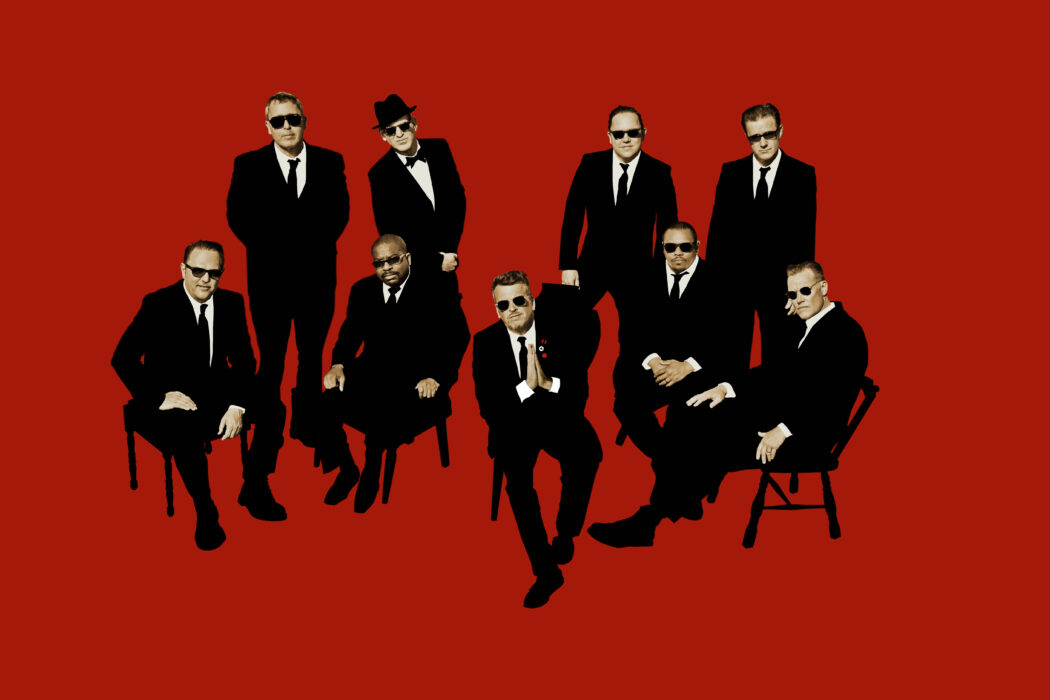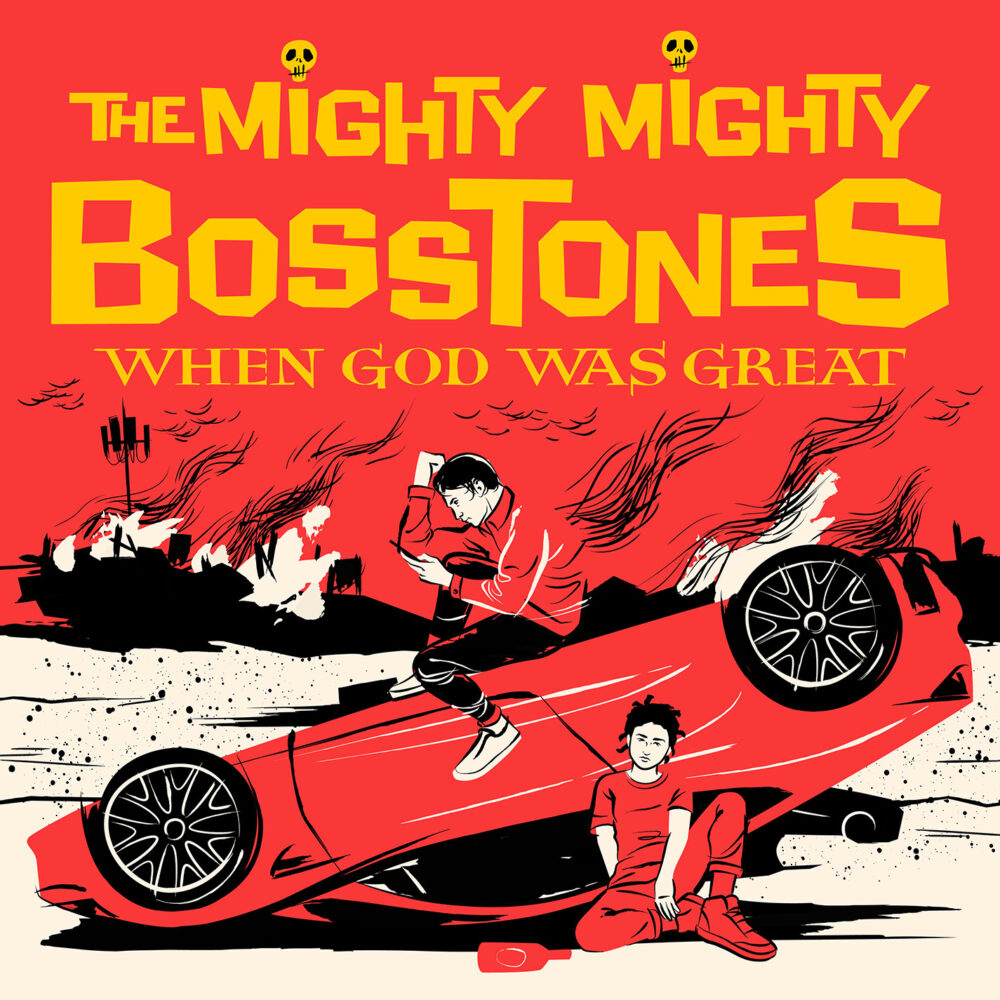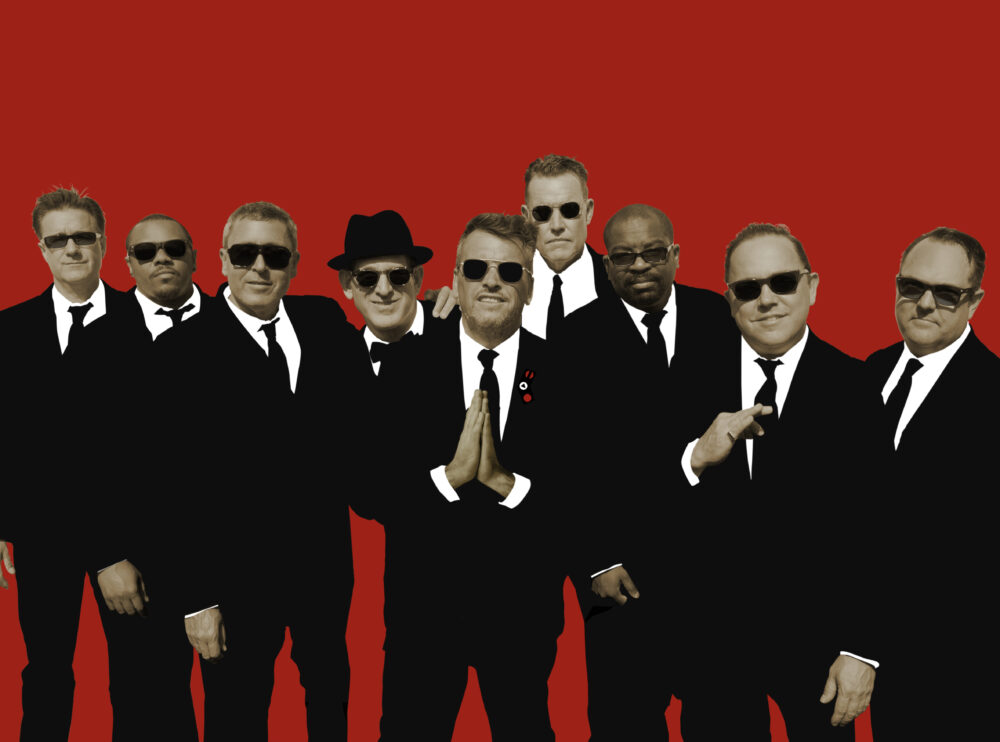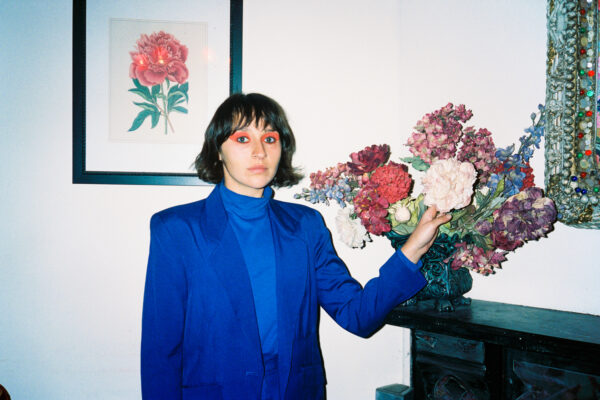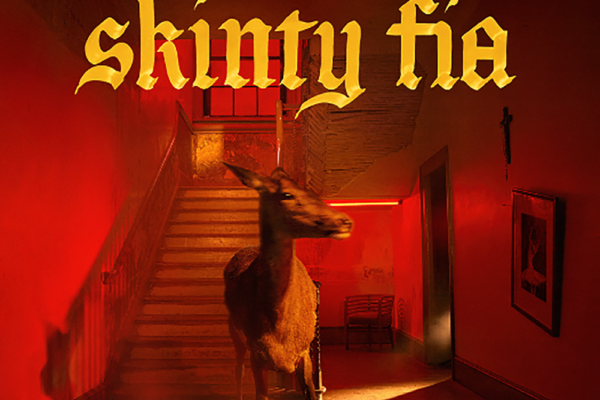Over the course of more than 30 years and 10 albums, the Mighty Mighty Bosstones have seemingly travelled to all four corners of the musical globe by exploring new genres and sounds, and exercising influences from out of left field. Now, with their 11th full-length album, When God Was Great, which dropped today (May 7), they’ve somehow found a fifth corner worth venturing to, and what they came away with, according to frontman Dicky Barrett, is their best and most timely work yet.
We recently had a chance to chat with Barrett about the new album, and what it meant to him and the rest of the Bosstones to put together an album that reflects on what may very well be the most challenging year of our lifetime from a musically-driven perspective, as well as just about everyone and everything that played a role in its creation. Check it out.
Jason Greenough: Jumping in, I feel like I’d be remiss if I didn’t ask how you’ve been holding up during the pandemic.
Dicky Barrett: Well, how I’ve been holding up is on the album. That’s pretty much it. We finished recording and making it, and it was officially in the can back in November of 2020, so I would say [I’ve been holding up] good. Making When God Was Great, you didn’t have to ask what the Bosstones were up to. From the moment we realized the world was changing, we kicked into gear, for some reasons I could go into, and others that I have yet to have to be able to explain. But what we did was hunker down and join forces, we reconnected with each other in a way that we haven’t in a little bit, got super focused, dialed in, and made this record. We weren’t trying to create the record, we were just making songs, but as we started putting them together, they started to live together really nicely.
With the album, if you ask if it’s about the pandemic or anything that was going on in 2020, the songs were being made in real time, so as everything was happening, that’s what we were writing about, and that’s what inspired the music, as well as the words. But, I also think it won’t feel dated. It’s something that was representative of what we were experiencing, as well as being something that will be worth listening to for years to come. Of course, as the creator, I want to say that, but I’ve made 11 Bosstones records. I’m an authority on it, so I think I can say that with both confidence and pride.
With the new album having been finished since November, what’s the overall feeling as we finally come up on release day? Do the songs still feel as powerful as they did when you were putting it all together?
That’s a good question, and I guess you’d get different answers from different guys in the band, but there’s definitely an excitement. It still feels very fresh to me, and as we released the songs individually, whether it be “The Final Parade,” “I Don’t Believe In Anything,” or “The Killing of Georgie (Part III),” I think people have really enjoyed them. You know the emoji where the top of the guy’s head is exploding? We’re getting a lot of those with these songs, so there’s a general excitement from the people that love the Bosstones, and there’s also people who are casual acquaintances, but are still going “holy shit, these are good songs,” and all indications are showing that this is going to be a strong record. If that’s what they think, they’d be right. You know, and I know.
For me, listening to the songs has me excited for the record, for sure, but I also can’t wait to hear them live. I can almost hear the whole room singing along already.
I’m glad you used the word “room.” When it comes to live music, that’s what “live” means to me. I’m glad you didn’t say “I can’t wait to log on some day, and see you perform these songs virtually,” because I don’t believe, though I’ll never say never, that you’re going to see that. It’s not in the cards, it’s not what I signed up for, or what I’m interested in, and when it comes to “live,” it’s about everyone in the room experiencing what we’re doing. That will forever be live music, and if it changes, and it becomes something else and it doesn’t appeal to me or the Bosstones, then I guess that’s the end of the road.
Now, you mentioned how the pandemic and the events that have unfolded over the last year were the inspiration for writing the songs in real time. How did that inspiration evolve during the process? Were there times where songs were darker because of the things that were happening? Because you mask that really well with how upbeat the record is, as a whole.
The only prerequisite for a Bosstones record, despite what we point out, what we spell out, what we’re singing about, or what the songs represent, is that by the end of the listen, there’s hope. That it’s better to be here than to not be here. We don’t necessarily go “oh shit, there isn’t any hope in this record, so we should inject some,” it’s just the way it comes out. That has to do with us together and the strength we have as friends, and who we are as people, and when we get together, that’s the way we feel. That’s the energy, the vibe, and all of those hippy things, but it’s true. It might sound corny, but that’s why our live shows are what they are, because when we’re together, that’s what surrounds us, so that’s what we’re bringing.
Other than that, we allow the songs, and the messages, and the meanings to be what they want to be. On this record maybe more than others in the past, due to the fact that we had the time, and we were all in our various workspaces, sharing files and creating songs, we had the time to let them go where they wanted to go, instead of steering it. After you’ve done 11 albums, you’ve earned the right to let it be what it wants to be. With our band, maybe more than with others, you can go “that’s very Bosstones,” but what is that? That’s a huge palette, and I would argue that it has a ton of range. If people feel differently, then fine, but I think that we’re never afraid to explore different genres or different musical directions or let the songs go in the direction that they want to go.
It’s funny that you mention exploring different genres and directions, because one song that really kind of caught me off guard on this record was the “Long As I Can See The Light” CCR cover. How did that make it into the mix?
If you go to the Throwdown, or any Bosstones show, there’s always some sort of quirky cover going on, like “The Ballad of Easy Rider,” which is an old Byrds song, or “I Can See Clearly Now.” I’m a ‘70s AM gold and ‘70s songwriting fanatic, so I had a handful of songs that i wanted to cover, and I was leaning towards that one, so I sent it over to JG, or keyboard player and told him that I wanted to arrange this in a way that sounds like us but still delivers the same message, and he did. It has that nice rock-steady, reggae, ska thing going on, but it’s also sort of country and swampy, like Creedence Clearwater is. The choice of a Creedence Clearwater song is a bit strange, but we got Tim Armstrong from Rancid involved with this record, co-producing it with Ted Hutt, and we’re going through the demos, and then I brought this song up to him and how we wanted to cover it. That’s when he told that John Fogerty and his brother grew up right down the street from him in Berkeley, so that was the moment we knew it was a done deal.
The thing about Creedence Clearwater is that they had seven number two songs in the span of about 4 years, and that was one of them, but they never had a number one hit.
Which is odd, given how legendary they are.
Interesting, right? Just hit after hit, but all number twos. At some point, Fogerty got screwed after someone moved in on him and his brother and just took the songs he wrote for this record company, and that’s why at some point in the ‘80s, you would see commercials about “CCR, the hits, out now” or whatever, and Fogerty hated that. So he started writing his own songs as John Fogerty, and I think “Centerfield” was his first number one.
That sounds about right.
I could go to Wikipedia, but I won’t. [laughs] And I may be pulling all of this out of my ass, but it’s good for the sake of this, right? Nobody really expects me to know shit about Creedence, so whatever. [laughs]
That’s a different musical direction for sure, having sent Creedence to Jamaica, but with “Certain Things,” that was directly inspired by us trying to write something as if we were writing it for Glen Campbell, and that’s where that came from.
Having mentioned getting Tim Armstrong involved, and how we first saw that involvement with the first single “The Final Parade,” that song is cool to me in a lot of ways, but mostly for the fact that it’s full of artists that not have influenced you guys, but also artists that you have, in turn, influenced over the years. Where did the idea come from to do a song like this?
With that song, there is just so much to unpack. You can start with the idea that the record label was going to release a different song as the first single, but Joe Gittleman said we should go big, to which the label said “it’s an 8-minute song, are you out of your mind?” and all conventional wisdom would say not to do it, but everything is different now. Plus, it’s an 8-minute song, yes, but you don’t get to minute 4 and go “okay, that’s enough,” it keeps unfolding as it keeps going. The best 8 minutes of your life, unless you absolutely can’t stand ska music, then it’s painful after the first 30 seconds. [laughs] But the 8-minute ride felt good. If it felt like it was just chugging along, then maybe we would’ve felt differently about releasing it as the first song, but to the very end, it felt good. It also gave room for all of the guests.
When we were making it, we wanted to end the record with the ultimate hope, and convey the message of “in our world, with our family and friends, and friends that we’ve made while doing what we’ve done for so many years, want to let you know that it’s going to be okay.” That didn’t feel false or phony, and we wanted to give that feeling of all of us together. Fans, friends, musicians, and that was the general theory of it. We knew, because we had done it as well, that anyone who wrote and recorded music had upped their home recording game, so when we asked people if they could send over tracks, and I hate even saying this because it’s cool to make people think that myself, and The Interrupters, and Roddy from The Specials were all standing at the mic together, but the truth is, we called and asked our friends if they would send us tracks. There were a lot of yes’ and very few no’s. But it was eight minutes, and we did the best that we could on it.
Was it one of those things where the more “yes” answers that came through, the longer you had to make the song, or was it more about filling an already predetermined 8-minute song with your friends?
We knew it was going to be long, and we knew that in order to accommodate, and make sure it wasn’t just a mess, it needed to have some space. I honestly think we would’ve figured out how to do more. We figured we would get everyone down for it, then we would figure out how to put it all together, and that was actually the most challenging part of it. Then we just put it on the laps of Ted and Tim, who said “thanks a fucking lot,” [laughs] but as they were putting together, they thought it was great.
For me, the song was great from the get-go, as I had been looking forward to new music from you guys, but what got me was when they start naming off the cities in the middle of the song. I can’t remember if that was Angelo Moore, or someone else, but for whatever reason, it’s my favorite part.
That’s Christian, the Bat Commander, from the Aquabats. Angelo does all the toasting parts.
If you know anything about Christian and the Aquabats, you know that he’s just a really funny person. If I call him for anything, he’ll do it, and vice versa. So I sent him the lyrics, and he sent that part back to me, and he’s listing off the cities, but then he started making up cities that make no sense, so I immediately wrote him back to ask if he could ever follow instructions. [laughs] So, he asked if he should redo, and I was like “No way, it’s the best part of the song.” Every time I get to that part, I just die laughing. Everyone listening back to it in the room was like “What is he doing?” and I was like “I don’t know, but I love it.” [laughs]
Another part of the song that I love is the ending, which ends with Reggae legend Stranger Cole, and he kind of went off on his own thing too where he starts singing about family and friends getting together, and that really sort of summed everything that went over the course of doing the record. Whether it was my daughters at the end of “Long As I Can See The Light,” or Leon’s daughter at the end of “The Killing of Georgie,” it’s about family and friends and the people you’ve put together in this life that help you get through both the best and the worst of times.
With all of these elements in play, and it coming to life under odd circumstances, what was your favorite aspect of putting this album together?
I would say just being with my friends and bandmates, who I’ve gone on quite a journey with. There was a feeling of “The world could be ending right now, and I couldn’t be any happier than I am creating with the talented people that allow me to create with them.” So that was generally it. I think the record sounds so good, because we pooled our resources and did what we do best, and that’s really what it was born of.
We’ve talked about “The Final Parade,” but with the other two singles being released, what went into the decision for those songs to be put out there first? How do you feel these songs represent the message you’re trying to convey on this record?
I think it’s going to be one of those things, and I speak for people who have been with us for years, where fans will go “this and that are the best.” This is undeniably going to be the best one, and I still there are songs on the record that are going to cause people to have the thought of “holy shit, this good,” and all the way down the line, for me, there’s not a weak song on the record.
Picking the songs themselves, Joe made the decision on the first one, and it was a good one, and it could very well wind up becoming a ska classic. The second one felt like a strong, hard-rocking song that felt sort of flawless to me. The third one is a strong message song, and there’s probably a hundred different ways we could’ve done it, but we wanted to give people a taste without showing our whole hand.
Having been the maestro from the beginning, what makes this album so different for you?
I guess the time in which it was created, and how we working on it, it felt very familiar, but it also felt like territory that we hadn’t been in before. There was just something very special about the way things lined up, and how we pulled it off made it a different thing. We difnt forget to enjoy the process, even though there was a strange sense of urgency that existed around the whole.
I don’t really have a full answer for it, or why it’s different. It just is. And I think that sort of feeling is going to be shared between longtime listeners and people who thought the “Knock On Wood” crew fell off the face of the earth.
From a listener’s perspective, I share that viewpoint. It’s hard to explain, but it feels different.
You can take The Magic of Youth, While We’re At It, or Pinpoints and Gin Joints, and talk about how they’re all good records, but there’s just something about this record that feels different. There will still be fans who will say “it’s not Question The Answers,” and there will be folks who think it’s better. But at the very least, everyone who listens to it will think “these guys are very competent, and they’re very good at being The Mighty Mighty Bosstones,” and I don’t think that can be denied or taken away from us.
They can try, but there’s nine of us, so good luck with that.
Buy or Stream When God Was Great HERE
Article: Jason Greenough

